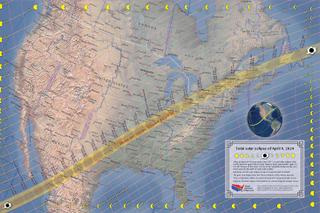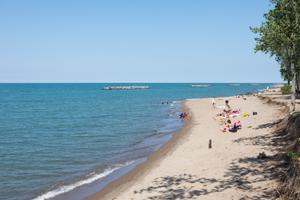This story first appeared in PA Local, a weekly newsletter by Spotlight PA taking a fresh, positive look at the incredible people, beautiful places, and delicious food of Pennsylvania. Sign up for free here.
Next year, an army of people will descend on Erie, Pennsylvania, to don mail-ordered glasses and watch the moon photobomb the sun.
The solar eclipse on April 8, 2024 will be visible all over the state, but Erie’s view will be exceptional — unless it’s cloudy. More on that in a moment.
Erie and Pennsylvania’s northwest corner are in the path of totality, a narrow band stretching from Texas to New England where the moon will 100% cover the sun, resulting in what past observers have described as a surreal, primeval, even hair-raising experience.
Streetlights will snap on midday. Some birds will flock. Some dogs will howl.
The farther you stray from the 124 mile-wide path of totality, the less the sun will be covered by the moon, and, the same observers say, the less profound the overall effect. As Smithsonian Magazine put it: The difference between partial and total is literally night and day.
In Pittsburgh, sun coverage will be around 97%. In State College, it’ll be 95%. For Philly, it’ll be 90%.
What makes Erie’s view so unique, and why local officials are preparing for a deluge of out-of-towners, is not only the extent of the eclipse there but the duration.
Erie’s blackout will last nearly four minutes, among the longest of any place on the path of totality.
Christine Temple with VisitErie said Erie County could see anywhere from 65,000 to 250,000 visitors — the high end of that range would double the county’s population overnight — and an economic impact on the order of $15 million.
If 2017′s eclipse is any indication, price gouging will happen. In fact, it’s already started.
Rooms at the “no frills” Hampton Inn in Meadville were recently listed at $900-a-night on Hotels.com. (It appears they’re no longer listed, but here’s a screenshot.) Rooms at the normally very budget-friendly La Quinta Inn are going for more than $500-a-night with fees in Erie.
Note: I called the Hampton Inn and was offered a room for the weekend of the eclipse — there are only a handful left — for less than $200, so maybe skip the travel sites. An employee at the La Quinta Inn pointed to an ongoing renovation in explaining their elevated price point, though nightly rates were lower in the runup to the eclipse and immediately after.
Prices are only set to rise as the event gets closer. Same for the glasses (buyer beware).

Hotels and lodges with a one-year reservation limit only started accepting eclipse holds last week. Steve Freysz, owner of the Spencer House Bed & Breakfast, a few blocks from Presque Isle Bay, told The Inquirer that one hopeful customer has been on a waiting list for seven years: “He calls every year to make sure he’s [still] on the list.”
Temple said officials are gauging hotel capacity. If there isn’t enough, their public messaging will stress Erie’s drivability from other population centers.
They’re also determining where in town they want eclipse-goers to be. To my dismay, Presque Isle, my first choice for beachside eclipse viewing, is not on the official list of suggested public places to watch the show in Erie, though the justification seemed reasonable.
”There’s only one road in and out. Traffic headaches could be astronomical,” Temple explained. “The sun is high enough in April that pretty much anywhere here will have good visibility.”
Erie won’t be on the path of totality again until the year 2144.
”This is truly a once-in-a-lifetime thing,” state Sen. Dan Laughlin (R., Erie) said by phone. “I don’t think our grandkids are going to see [the one in 2144], well, maybe our grandkids but certainly not us, right, Colin?”
I glanced knowingly at a shelf full of expensive herbal supplements stocked across the room.
Laughlin, chair of the state Senate Majority Policy Committee, said he might host a committee hearing around April 8 in Erie to give his colleagues a front-row seat: “I have to host hearings throughout the state anyway. Why not do it on a day like that?”
Laughlin is characteristically bullish on Erie’s charm — “Maybe some of the [eclipse] visitors will say ‘I forgot how nice it is here’ or ‘We’ll move here during our retirement’ or ‘let’s raise our family here’” — but if anything is giving him pause, it’s the April sky itself.
”Listen, it’s a genuine concern,” Laughlin said of cloud cover. “We’ll keep our fingers crossed.”
Let’s start with the bad news.
This map says that of all the places in the 2024 path of totality, Erie has among the highest chances of clouds spoiling the view. Space.com reached a similar conclusion using local climatological data from the National Oceanic and Atmospheric Administration. It gave Erie a 39.2% chance of clear skies, among the lowest chances of any area in the path.
Now the good news.
Keith Jaszka, a meteorologist at the National Weather Service in Cleveland, which covers Erie, said a ridge of high pressure and a breeze from a cool Lake Erie would all but guarantee ideal viewing conditions, the latter keeping obstructive cumulus clouds from forming.
But there are several active storm tracks in April — the Alberta Clipper, the Colorado Low, and the Gulf/Hatteras Low — that could complicate things.
Of course, it’s way too early to speak with certainty. Jaszka said check back in about 50 weeks.
WHILE YOU’RE HERE… If you learned something from this story, pay it forward and become a member of Spotlight PA so someone else can in the future at spotlightpa.org/donate. Spotlight PA is funded by foundations and readers like you who are committed to accountability journalism that gets results.
